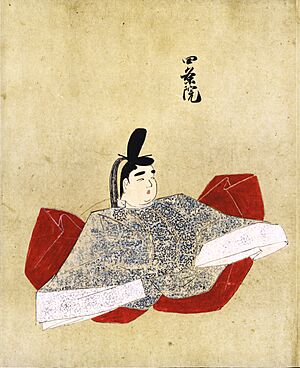Emperor Shijō facts for kids
Quick facts for kids Emperor Shijō四条天皇 |
|||||
|---|---|---|---|---|---|

Shijō, Tenshi Sekkan Miei
|
|||||
| Emperor of Japan | |||||
| Reign | November 17, 1232 – February 10, 1242 | ||||
| Coronation | January 16, 1233 | ||||
| Predecessor | Go-Horikawa | ||||
| Successor | Go-Saga | ||||
| Shōgun | Kujō Yoritsune | ||||
| Born | March 17, 1231 | ||||
| Died | February 10, 1242 (aged 10) | ||||
| Burial | Tsukinowa no Misasagi (月輪陵) (Kyoto) | ||||
|
|||||
| House | Yamato | ||||
| Father | Emperor Go-Horikawa | ||||
| Mother | Kujō Shunshi | ||||
Emperor Shijō (四条天皇, Shijō-tennō) was the 87th emperor of Japan. He was born on March 17, 1231, and passed away on February 10, 1242. His time as emperor lasted from 1232 to 1242. He became emperor when he was very young.
Contents
Emperor Shijō's Family and Early Life
Before he became emperor, his personal name was Mitsuhito-shinnō (秀仁親王). He was also known as Tosihito-shinnō.
Emperor Shijō was the first son of Emperor Go-Horikawa. He did not have any children because he was very young when he died.
Key Events During Shijō's Reign
Emperor Shijō ruled from October 26, 1232, until February 10, 1242.
- 1232: Emperor Go-Horikawa, Shijō's father, stepped down from the throne. His oldest son, Mitsuhito, then became the new emperor. This is known as the senso (receiving the succession). Soon after, Emperor Shijō officially took the throne in a ceremony called sokui.
Emperor Shijō died in 1242 due to an accident. His special tomb, called a misasagi, is located at Sennyū-ji in Kyoto. It is known as the Nochi no Tsukinowa no Higashiyama no misasagi (後月輪東山陵).
Since Emperor Shijō was very young, and his father, the Retired Emperor Go-Horikawa, died only two years later, other powerful family members helped lead the country. These leaders included his maternal relatives, Kujō Michiie and Saionji Kintsune.
Important Court Officials: The Kugyō
The Kugyō (公卿) was a small group of the most powerful men in the Japanese court. These officials worked closely with the emperor. Even when the emperor's power outside the palace was not very strong, this group still held important positions.
Usually, there were only three or four men in this elite group at any time. They were often from noble families, and their experience helped them reach the highest levels of government. During Emperor Shijō's reign, some of the top Daijō-kan (government department) officials included:
- Sesshō (Regent), Kujō Norizane, who helped rule from 1231–1232 and again from 1232–1235.
- Sesshō, Kujō Michiie, from 1235–1237.
- Sesshō, Konoe Kanetsune, from 1237–1242.
Japanese Era Names During Shijō's Rule
In Japan, years are also identified by special era names, called nengō. Here are the nengō that were used during Emperor Shijō's reign:
- Jōei (1232–1234)
- Tenpuku (1233–1234)
- Bunryaku (1234–1235)
- Katei (1235–1238)
- Ryakunin (1238–1239)
- En'ō (1239–1240)
- Ninji (1240–1243)
See also
 In Spanish: Shijō Tennō para niños
In Spanish: Shijō Tennō para niños
- Emperor of Japan
- List of Emperors of Japan
- Imperial cult
 | Bessie Coleman |
 | Spann Watson |
 | Jill E. Brown |
 | Sherman W. White |

